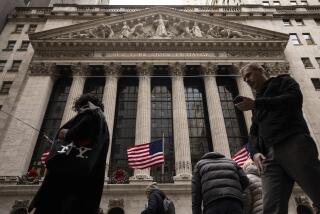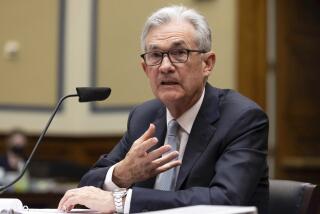More Business Economists See Recession by End of ’88
- Share via
WASHINGTON — A survey of 209 economists for top U.S. corporations released Monday found half forecasting that the country would be in a recession within a year as a result of the shock to consumer confidence delivered by the stock market crash.
The National Assn. of Business Economists said a poll of members taken in November found a big increase in the number of people forecasting an imminent recession.
Fully 50% of those surveyed forecast that the United States would topple into a recession before the end of next year, bad news for Republicans hoping to hold onto the White House. In the previous survey, taken in August, only one-third were that pessimistic.
“This is the highest percentage we have had forecasting a recession within the next year since the current recovery got under way in 1982,” Jerry Jordan, chief economist for First Interstate Bancorp of Los Angeles, said at a press briefing where the poll results were released.
In the new survey, 38% of the economists said they expected that the recession would begin in 1989, the first year of the next President’s term of office, meaning that 88% of those surveyed expected the current expansion will not last until 1990.
“Economists are looking for consumer spending, which is two-thirds of all economic activity, to be constrained by the stock market collapse,” Jordan said. “And they don’t see any offsetting sources of strength.”
For 1987, the economists said the economy, as measured by the gross national product, would expand at a 3.2% annual rate, matching the forecast made last January by the Reagan Administration.
But the Wall Street turmoil had caused economists to shave their forecasts for 1988 GNP growth to a sluggish 2% annual rate, down from 2.7% in the survey taken before the October crash.
The sluggish growth will send the unemployment rate rising to 6.3% by the end of next year, the economists said. It dropped to an eight-year low of 5.9% last month.
Other findings include:
- Consumer prices will rise by 4.3% next year, matching the expected increase for this year.
- The U.S. foreign trade deficit will climb to a record $160 billion this year but finally start to show improvement in 1988, dropping to $142 billion. The 1986 deficit was $156.2 billion.
- The federal budget deficit, which dipped to $148 billion in the fiscal year ended Sept. 30 because of a windfall in tax revenue, will worsen again in the current fiscal year, rising to $160 billion.
More to Read
Inside the business of entertainment
The Wide Shot brings you news, analysis and insights on everything from streaming wars to production — and what it all means for the future.
You may occasionally receive promotional content from the Los Angeles Times.










